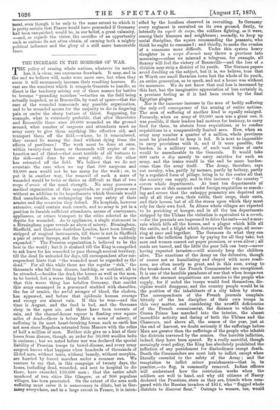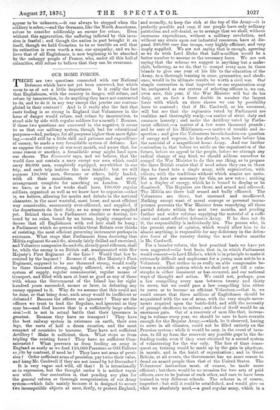THE INCREASE IN THE HORRORS OF WAR.
THE policy of arming whole nations, whatever its merits, has, it is clear, one enormous drawback. It may, and in the end we believe will, make wars more rare, but when they occur it will enormously increase their resulting horrors. So vast are the numbers which it compels Generals to handle, so direct is the tendency arising out of those masses for battles to become "pounding matches "—tactics on the field being actually impeded, as at Rezonville, by want of space—that the care of the wounded transcends any possible organization, and to be wounded means for the majority to die in lingering pain or under the sharp torture of thirst. Supposing, for example, what is extremely probable, that after Gravelotte and Rezonville there were 50,000 wounded on the ground around, what number of surgeons and attendants must an army carry to give them anything like effective aid, and transport them off the field,—where, be it remembered, they cannot lie among the dead without dying from the effects of pestilence ? The work must be done at once, within twenty-four hours, or thousands will expire of ex- haustion and of thirst—that most terrible of all tortures to the sick—and done by one army only, for the other has retreated off the field. We believe that we do not overstate the case when we say that 500 surgeons and 10,000 men would not be too many for the work ; or, to put it in another way, the removal of such a mass of wounded would be twice or thrice as difficult as that of two corps d'arme'e of the usual strength. No army possesses a medical organization of this magnitude, or could possess one without an addition to its impedimenta which Generals would find unendurable, as endangering the very safety of their armies and the countries they defend. No hospitals, however extensive, could contain such crowds, and no army is yet in a position to furnish sufficient attendants, means of conveyance, appliances, or return transport to the cities selected as the depots for wounded. As to appliances, a single statement in a Birmingham paper reveals an abyss of misery. Birmingham, Sheffield, and therefore doubtless London, have been literally stripped of surgical instruments, till there is not in Sheffield a pair of artery forceps, and the trade "cannot be suddenly expanded." The Prussian organization is believed to be the best in the world ; but it is strained till the King is compelled to ask leave for his wounded to pass through neutral territory, till the dead lie unburied for days, till correspondent after cor- respondent hints that "the wounded must be regarded as the dead." For all this while there are the regular "sick," the thousands who fall from disease, hardship, or accident, all to be attended,—besides the dead, the horses as well as the men, to be buried, lest a worse thing befall. It is said in whispers that this worse thing has befallen Germany, that amidst this army encamped in a graveyard studded with shambles, the foe of armies, the awful avenger of blood, the cholera, has appeared, and before that epidemic human courage and energy are almost vain. If this be true—and the time is August, and the food is bad, and the Germans sleep in the open air, and there have been torrents of rain, and the charnel-house vapour is floating over square miles of dead—there is before Metz a scene of misery, of suffering in its most heart-breaking forms, such as earth has not seen since Napoleon retreated from Moscow with the relics of half a million of men. Neither side give us a hint of their losses from disease, though an order for 30,000 woollen belts is ominous ; but we noted before war was declared the special liability of Prussian troops to bowel-disease, and every army surgeon knows what happens when hundreds of thousands of ill-fed men, without tents, without, brandy, without morphia, are hurried by forced marches under a summer sun. We venture to say that, in this campaign of twenty days, the losses, including dead, wounded, and sent to hospital to die there, have exceeded 150,000 men ; that the entire adult manhood of two cities like Glasgow, or of 900 populous villages, has been prostrated. On the extent of the area such suffering must cover it is unnecessary to dilate, but in Ger- many everywhere, and to a large extent in France, it is inten- sified by the localism observed in recruiting. In Germany every regiment is recruited on its own groond, firstly, to. intensify its esprit de corps, the soldiers fighting, as it were, among their kinsmen and neighbours ; secondly, to keep up. social discipline, the squire commanding the peasants, who think he ought to command; and thirdly, to make the evasion of a summons more difficult. Under this system heavy slaughter in a corps cr armee may throw a province into- mourning—unless we misread a telegram, for example, all Saxony will feel the victory of Rezonville—and the loss of a division may strip a district of its youth. The German papers. avoid dwelling on the subject, but it is, we believe, true that at Worth one small Bavarian town lost the whole of its youth,_ an entire generation, so to speak, and net a house was without its mourners. We do not know that real loss is increased by this fact, but the imaginative appreciation of loss certainly is, a province feeling as if it had been struck by the final Egyptian plague.
Nor is the immense increase in the area of bodily suffering the only evil consequence of the arming of entire nations. The area of suffering of another kind is equally enlarged. Formerly, when an army of 60,000 men was a great one, it was possible, if their leaders had motives for leniency, to carry food for them, to abstain from requisitions, or to confine requisitions to a comparatively limited area. Now, when an army may number a quarter of a million, whole provinces must be plundered to keep it fed. It is next to impossible to carry provisions with it, and if it were possible, the burden, in a military sense, of such vast trains of carts
would be unendurable to the Generals. It would take 800 carts a day merely to carry eatables for such an army, and the trains would in the end be more burden- some than the army itself. The Army, therefore, rays out cavalry, who, partly by menace, partly by bribery, partly by a regulated form of pillage, bring in to the centre all that the country can supply, and in this instance "the country" covers whole departments. At least ten departments or France are at this moment under foreign requisition so search- ing and severe that the unhappy peasantry are deprived not only of all they own, their cattle, their crops, their carts, and their horses, but of all the stores upon which they must rely for their own food. In Alsace whole villages are reported to be perishing of hunger, and in all the ten departments stripped by the Uhlans the visitation is equivalent to a corve'e, —for the peasants are impressed to drive the carts—and a mur- rain which kills all the horses, and a plague which kills all the cattle, and a blight which destroys all the crops, all occur- ring at once and together. The Germans do what they can to make the infliction lighter by paying for all they take, but. men and women cannot eat paper promises, or even silver ; all roads are barred, and the little the poor folk can bury—never" having expected invasion—will scarcely keep the children alive. The exactions of the Army on the defensive, though of course not so humiliating and obeyed with more readi- ness, are often nearly as great, and in this case, owing to- the break-down of the French Commissariat are exceptional. It is one of the horrible paradoxes of war that when troops run short the sternest requisitions are mercies to the people who- supply, for if unfed the troops would feed themselves, dis- cipline would disappear, and the country people would be in the position of the inhabitants of a city taken by storm. The correspondents of the French journals complain bitterly of the lax discipline of their own troops in- this very matter, and considering the avollfrd deficiencies- of the French commissariat, the distance to which the- Crown Prince has marched into the interior, the almost incredible activity and daring of both the Uhlans and the- Chasseurs, and above all, the season of the year, just at the end of harvest, we doubt seriously if the sufferings before- Metz are greater than the sufferings of the people who inhabit the districts traversed by the armies. One horrible infliction, indeed, they have been spared. By a really merciful, though_ seemingly cruel policy, the King has absolutely prohibited the infliction of any punishment for disobedience except death. Death the Commanders are most loth to inflict, except when literally essential to the safety of the Army ; and the temptation to inflict minor punishments—that is, in practice,—to flog, is summarily removed. Indian officers will understand how the restriction works when the soldiers are well in hand, and why old citizens of Nancy declared the Prussians, stern as they are, friends when com- pared with the Russian invaders of 1814, who "flogged whole districts to discover flour." Outrage to women, too, would
appear to be unknown,—it can always be stopped when the soldiery is sober,—and the Germans, like the North Americans, refuse to consider soldiership an excuse for crime. Even without this aggravation, the suffering inflicted by this inva- sion is fearful ; and though the nation in part brought it on itself, though we hold Cassarism to be so terrible an evil that its extinction is even worth a war, our sympathy, and we be- lieve that of all Englishmen, is now beginning to be absorbed by the unhappy people of France, who, under all this hail of calamities, still refuse to believe that they can be overcome.































 Previous page
Previous page